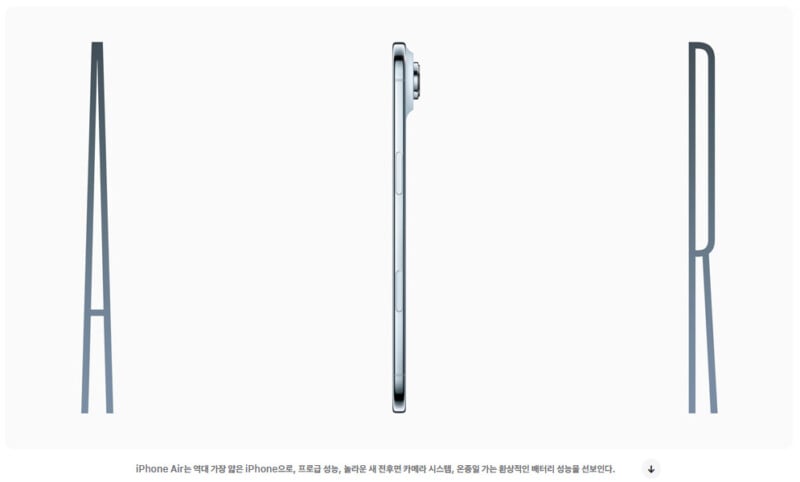Apple Quietly Edits iPhone Ads in South Korea That Offended Men
![]()
Apple’s launch of the iPhone 17 Air, the thinnest iPhone in history, has drawn attention not only for the device itself but also for a subtle but crucial change in its marketing approach for South Korea.
Industry analysts suggest the adjustment reflects Apple’s awareness of cultural context. The pinching hand gesture, known locally as jibgeson or “crab hand,” has been culturally associated with online anti-men communities as a mocking symbol implying small male genitalia. Past appearances of the gesture in Korean advertisements and media have sparked boycotts and public backlash, prompting companies to exercise caution.
The iPhone 17 Air: Ultra-Thin, Ultra-Light
PetaPixel recently covered the iPhone 17 Air debut at Apple Park in Cupertino, California, featuring a thickness of 0.22 in (5.6 mm), 0.008 in (0.2 mm) thinner than Samsung’s Galaxy S25 Edge, and a weight of 5.8 oz (165 g). CEO Tim Cook described the device as “a game changer” and emphasized its portability and design.
To illustrate its ultra-slim form factor, Apple’s global advertisements depict the phone pinched between a thumb and index finger. While this imagery appears on websites in the U.S., China, Japan, Hong Kong, Taiwan, Germany, Britain, and France, the Korean version displays the phone alone, without fingers.
![]()

Past Controversies Highlight Sensitivity
The pinching gesture has a history of stirring controversy in Korea. Notably, game publisher Nexon removed a MapleStory promotional video in 2023 after complaints that a character appeared to use the gesture. Similarly, Naver Webtoon faced backlash over merchandise advertisements, and steelmaker Posco removed an animated recruitment video in 2023 after the gesture was perceived as misandric.
These incidents demonstrate how even seemingly innocuous gestures can carry unintended connotations in different cultural contexts, particularly among younger male demographics. Cyberbullying and misidentification have occurred when male and female netizens incorrectly attributed creative decisions to specific individuals involved in promotional content.
So serious are these scandals that in 2023, during the MapleStory controversy, the BBC reported that one of the illustrators was doxxed and received death threats due to “one frame” from the trailer where a character appears to have its hands in a pinching gesture.

“There were insults I’d never heard before, they were disgusting and inhumane,” the illustrator shares with the BBC.
MapleStory quickly pulled the promotional video, and subsequent investigations revealed that the illustrator who was initially targeted had no involvement with the disputed animation. The scandal, however, continues to be remembered as a cautionary example of how quickly online controversies can escalate.
Balancing Global Branding With Local Norms
Apple’s Korea-specific ad adjustment underscores the challenges multinational companies face in global marketing. While the gesture is ordinary in most markets, in South Korea it has developed a charged social meaning, prompting Apple to omit it rather than risk controversy.
The decision reflects a broader industry trend of preemptive cultural sensitivity, especially in regions where gender-related symbols have sparked online disputes or boycotts. By altering the advertisement subtly, Apple maintained its global visual identity while avoiding potential backlash among Korean consumers.
Image credits: Apple, MapleStory